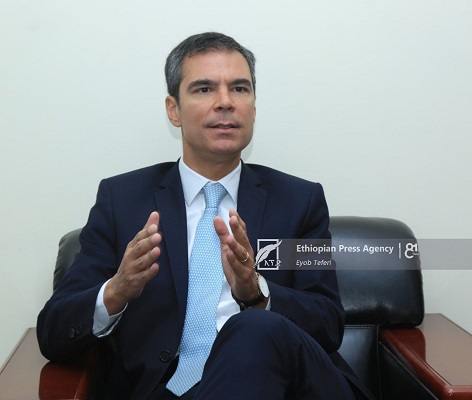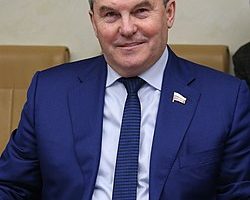
BY GIRMACHEW GASHAW
The guest of Herald for today is Brazilian Ambassador to Ethiopia Jandyr Ferreira Dos Santos. He is also the Permanent Representative of Brazil to the African Union, the United Nations Economic Commission for Africa (UNECA) as well as the Non-Resident Ambassador of Brazil to Djibouti and to South Sudan.
Santos has more than two decades of experience with the Brazilian diplomatic service and has also served at the Embassies of Brazil in Maputo (Mozambique), New Delhi (India), as well as at the Permanent Mission of Brazil to the United Nations in New York (First Committee), representing Brazil in international negotiations on topics including proliferation and arms control.
The Ethiopian Herald paid a visit to the embassy and raised a range of concerns focused on the mounting bilateral relations between the two countries. Have a nice read.
As a new ambassador to Ethiopia, how did you find Ethiopia as a whole?
I arrived four months ago and I am extremely motivated to deepen my knowledge and understanding of this vibrant country. This is the second time I live and work in Africa (I was posted to Mozambique back in 2010) and I am confident to say that Ethiopia is indeed culturally and historically unique in the continent. One of Africa’s fastest-growing economies and home to diverse panoply of peoples and landscapes, this is a remarkable place and I look forward to working with Ethiopian colleagues with a view to strengthening bilateral relations with Brazil.
Here in Ethiopia, Brazil is highly remembered by many people for its marvelous history in Football. How is Ethiopia viewed in Brazil?
I believe most Brazilians see Ethiopia through historical and cultural lenses. As a country that is a symbol of the African struggle against colonialism, the cradle of the human species and the birthplace of coffee. Besides this, there is much to be done so as to increase the knowledge of Brazilians about the actual importance of Ethiopia to Africa, to the world and to our national interests. Rest assured I am working on that.
How is the current situation of the diplomatic relations between Brazil and Ethiopia? How is the activity of the Brazilian community in Ethiopia? What about Ethiopians in Brazil?
Brazil and Ethiopia established diplomatic relations 72 years ago and since then have enjoyed very friendly relations. We have been gradually deepening our ties, increasing our bilateral trade and establishing cooperation initiatives in different fields. More recently, in May 2021 Brazil and Ethiopia held their Second Bilateral Political Consultations and we expect the third meeting to take place this year.
The Brazilian community in Ethiopia is small and mostly employees of international organizations, such as the United Nations and its agencies operating here. There are a few other individuals working as humanitarian agents and as engineers in the GERD construction site.
As for the Ethiopian community in Brazil the situation is very similar. There isn’t a history of emigration from Ethiopia to Brazil, with a few notable exceptions such as the Brazilian-born renowned musician Jorge Ben Jor, for instance, who has Ethiopian ancestry. In addition to that, Ethiopian entrepreneurs have recently shown a remarkable interest in my country and there is a growing business tourism influx. We expect it to increase as trade relations between companies from both countries develop even further.
What plan do you have in terms of bolstering the bilateral relations between Brazil and Ethiopia?
Our bilateral relations have a huge unfulfilled potential. In a wider perspective, as a developing country Brazil sees Africa, and obviously Ethiopia, as an equal partner with whom it can establish high-level initiatives to tackle shared challenges, through cooperation and the exchange of views on important topics of the international agenda, such as food self-sufficiency, climate change and trade. In this sense, as the world recovers from the disruptions caused by the pandemic crisis and the war in Eastern Europe, I personally see real prospects for a mutually beneficial partnership
that will allow for growth in bilateral trade and in investment flows from Brazilian companies into Ethiopia. To turn this into reality we must raise awareness of the existent opportunities in both countries and implement long-term trade promotion strategies. The reopening of the Embassy of Ethiopia in Brazil would be an important step towards that objective.
Would you please explain about Brazil’s prestigious award of order of Rio Branco and the reason for awarding it to Ethiopian Airlines group and EAL’s role in connecting Brazil with Africa?
I am glad you raised this subject because this award represents Brazil’s willingness to strengthen its ties with Ethiopia. The Order of Rio Branco is one of the most important official recognitions given by the Government of Brazil to people or companies who have performed acts or services of distinguished merit and virtue. The awarding of the Rio Branco medal to both the Ethiopian Airlines CEO and the head of office in Brazil was a token of appreciation to the company’s crucial role in the challenging operation carried out by Brazil in 2020 to repatriate fellow nationals who were caught up stranded during the air traffic shutdown as a consequence of the COVID-19 pandemic. The logistic support provided by Ethiopian Airlines was also of paramount importance to the transportation of essential medical supplies to Brazil and other Latin-American countries.
Currently, the Ethiopian carrier is operating cargo flights and daily passenger flights to São Paulo, which is a hub connecting the whole of Latin America. As Ethiopian Airlines connections to Brazil increase so does the potential for more business, tourism and bilateral partnerships.
The two countries have similar objectives in connection to ecosystem, development goals and foreign policy. How these fertile grounds of cooperation would be strengthened especially in your tenure?
As you correctly mentioned, Brazil and Ethiopia share many common objectives in a wide range of areas, especially in the multilateral arena. I am convinced that cooperation programs and initiatives will constitute the common thread for the exchanges of Brazil with developing countries and other partners, with special attention to Africa. In this sense, I have been engaging with Ethiopian authorities to identify possible areas of partnership.
In the health sector, we have a strong partnership with the Ethiopian Ministry of Health on maternal and early childhood health and nutrition that are very important components of the Millennium Development Goals of the United Nations. We will also continue working with Ethiopia and other African and Latin American countries in the United Nations to advance agendas that are important for the developing countries, such as climate change.
Brazil has all the conditions to consolidate itself as a model of energy transition and low-carbon economy. It will require its own resources and persistent implementation of financing commitments made by developed countries. And it will also require active and determined environmental and climate diplomacy from our part in order to defend our interests so that we can continue to play a role of facilitator and generator of consensus that, since the preparation of Rio-92, Brazil has been able to play. For that reason, Brazil has officially launched a bid for the northern city of Belem to host the COP-30 climate summit in 2025.
Your country has a rich experience in agricultural practices. How would the two countries enhance their cooperation in this regard so as to ensure sustainable growth? Brazilian’s are actively engaged in sustainable forest and acid soil management here in Ethiopia. Would you further elaborate it?
Over the past two decades, Brazil – the fifth largest country in area and the largest in terms of arable land – has consolidated its position as a major producer of agricultural commodities and related food products as well as a supplier to international markets. We are now the largest exporter of beef (23 percent of global exports) and its second largest producer.
Since the 1960s, we have gone through an intensive process of modernization of our agricultural production that included the expansion of arable land to regions of acid soil, which demanded an effort to change the soil’s PH. This is the kind of experience we have been sharing with Ethiopia.
In this country, correction of acid soils can open vast lands to modern agriculture, which is essential to increase agricultural output and guarantee food security. The same applies to forest management. Brazil is also a big producer of timber, paper and other forest products. But this was only possible due to the correct management of forests (natural or planted). If trees are being planted to create a forest for timber or paper, for example, one cannot plant them randomly, there must be proper selection of specimens that grow quicker and have a more uniform shape, larger trunks and so on. This is also the expertise we are planning to share with Ethiopia.
Technology, skills, knowledge exchange and partnership in science and technology are some of the areas the two countries are working to bolster their relations? Would you tell me the progress? Especially in coffee related technologies?
South-South cooperation is one of the central elements of Brazil’s relations to developing countries in general, and Ethiopia in particular. We have practiced the concept of not simply receiving knowledge from developed countries, but also sharing our own experiences with others in effective partnerships towards development. South-South cooperation contributes to consolidating Brazil’s relations with partner countries as it enhances general exchange; generates, disseminates and applies technical knowledge; builds human resource capacity; and, mainly, strengthens institutions in all nations involved.
We have been discussing with Ethiopian authorities possible partnership projects, which will be implemented in accordance with the principles of South-South cooperation: they must be demand driven, which means that the receiving country would have to request Brazil’s cooperation on a specific field, such as the coffee sector you mentioned; they impose no conditionality, as we do not require the receiving countries, for instance, to buy our machinery or technology; and they do not interfere in the beneficiary country’s internal affairs. The ultimate goal of technical cooperation – exchanging experiences and knowledge, materializes reciprocal solidarity among peoples and does not only benefit recipient countries, but Brazil as well.
As a developing country, Brazil has faced many of the challenges Ethiopia faces nowadays in its development process. For that reason, it is natural that we have a better understanding of your challenges and are ready to work together with you to identify better and less costly solutions. Not to mention that we are both tropical countries and so, in terms of agriculture, we have quite similar weather and soil conditions.
As a member of BRICS what role do you think is your country playing globally, specifically to Africa and Ethiopia?
As a member of the BRICS, Brazil commends the efforts of the African countries, the African Union (AU) and the sub-regional organizations to address regional challenges, including maintaining peace and security, post conflict reconstruction as well as development efforts. We fully support the AU Agenda 2063 and Africa´s efforts towards integration through the development of the African Continental Free Trade Area.
In this context, Brazil’s relations with Africa and Ethiopia are fully aligned to our common goal of supporting the social and economic development of the continent. It is worth noting that President Lula, whose 4-year term began this year, has Africa amongst its top priorities abroad. This engagement will mark a return to the traditional Brazilian Universalist approach to foreign policy and a renewed comeback to Africa.
Ethiopia is conducive for investment especially for those who aspire to invest in the manufacturing sector. Would you tell me the intention of Brazilian investors?
Brazil has a large and diversified economy as well as a massive domestic market of more than 200 million people. For that reason, Brazilian companies tend in general to favor domestic investment and domestic human and natural resources. However, this does not mean that Brazilian companies do not look for investment opportunities abroad. Brazil’s presence in Africa is visible in sectors like mining, cement, logistics, energy, food and beverage, buses and airplanes. With peace, stability and a good business environment, the interest of Brazilian companies in investing in Ethiopia will inevitably grow.
Would you tell me the contribution of the two countries in terms of reversing the climate change impact?
Brazil and Ethiopia are parties to the main multilateral agreements on climate change, such as the United Nations Framework Convention on Climate Change (UNFCCC), the Kyoto Protocol and the Paris Agreement. Ethiopia shares our concerns regarding the impact of climate change on our planet, especially in developing countries. Brazil, who is a major player in multilateral negotiations on climate change, has recently committed to reduce greenhouse gas emissions by 37 percent by 2025 and by 50 per cent by 2030.
Brazil also stands by its conviction that solutions to the climate global crisis demand sustainable development, aiming for carbon neutrality in the whole of the economic activities, an increase in the capacity of adaptation, as well as risk reduction and the end of unsustainable production and consumption patterns. Additionally, as for the UN Convention on Biological Diversity Brazil has called for robust financial mechanisms capable of enabling developing countries to implement the agreement at the national level, in compliance with the “principle of common but differentiated responsibilities”.
How do you explain the bilateral relation of the two countries in the health sector? Would you briefly tell us about a project being developed in hospitals in Addis Ababa and Bahir Dar that started with a donation of medicines from the Brazilian civil society?
Brazil and Ethiopia have a very good cooperation in the health sector. H.E. Minister [of Health] Lia Tadesse visited my country in 2019 and became acquainted to projects on maternal and early childhood health and nutrition. Upon her return, she decided to start a pilot project in Addis Ababa focused on early childhood. More recently, we collaborated in the celebration of the Pink October campaign against breast cancer. This is one of the most common cancer types in Ethiopia and prevention and early detection are essential to increase recovery rates.
Another important cause of deaths in Ethiopia is heart diseases. In this sense, the World Stroke Organization, together with the “Rede Brasil-AVC” (Brazil Stroke Network), both organizations headed by Brazilian doctor Sheila Martins, have started a pilot project in collaboration with Ethiopian neurologist and stroke specialist Dr. Mehari Gebreyohanns to create stroke specialized units in hospitals in Bahir Dar (Tibebe Ghion Specialized Hospital and Felege Hiwot Hospital) and in Addis Ababa Tikur Anbessa Specialized Hospital. Training was also offered and medicine donated.
How do you see the collaboration of the two countries in sport and culture? Football may be one area of cooperation between the two countries. Would you tell me the plan you have in terms of replicating best practice of your country for Ethiopia?
Brazil and Ethiopia share many common values in sports and culture. It is worth remembering that the majority of Brazil’s population declares itself to be of African origin. This growing movement of self-identification with Africa proves that we are proud of our mixed origins and identify many of our cultural traditions, be it in terms of religion, food, music or sports as being of African origin. In this sense, I believe there are plenty of opportunities to collaborate with Ethiopia in culture and sports. Last year, for example, we brought to Addis Ababa Brazilian chef Dadá, from the city of Salvador in the Northeast of Brazil, for a food-week organized in collaboration with the Embassy of Portugal and Skylight Hotel. Dadá’s food has a very distinctive African flavor which was highly appreciated.
In the field of sports, unfortunately we have recently gone through a very sad moment with the loss of Pelé, the most important football player of all time. Despite the sadness that prevailed in my country I was happy to find out that Bisrate Gebriel Wendemamach Sports Association in Addis Ababa decided to honor him in a recent celebration. Such a spontaneous initiative from the Ethiopian civil society proves that our countries have a lot of common interests and many possibilities of cooperation in the fields of culture and sports.
How is the flow of Brazilian tourists to Ethiopia?
Addis Ababa Bole International Airport has become one of the most important hubs for Brazilian passengers traveling to Africa, the Middle East and Asia, and there is a huge potential for increase in the flow of Brazilian tourists to this country. The current frequency of Ethiopian Airlines flights to São Paulo, which now operate daily, together with recent measures by Ethiopian authorities to facilitate the issuing of tourist visas, have had a positive impact on the inflow of Brazilian tourists to this country.
I have also been in contact with Nasise Chali, Minister of Tourism, as well as with Ethiopian Airlines in order to identify and help implement measures that could further increase the flow of Brazilian tourists willing to discover the beauties of the Land of Origins.
Thank you very much
It is my pleasure
THE ETHIOPIAN HERALD SATURDAY 11 FEBRUARY 2023





